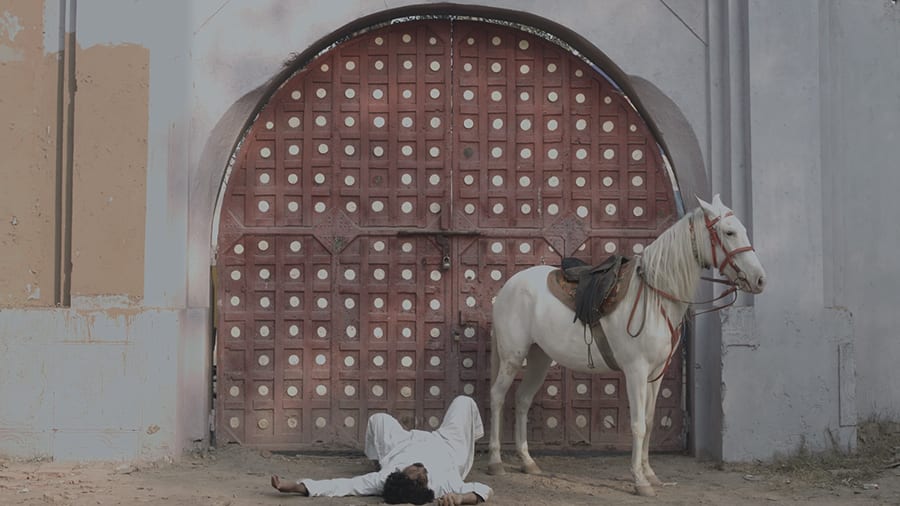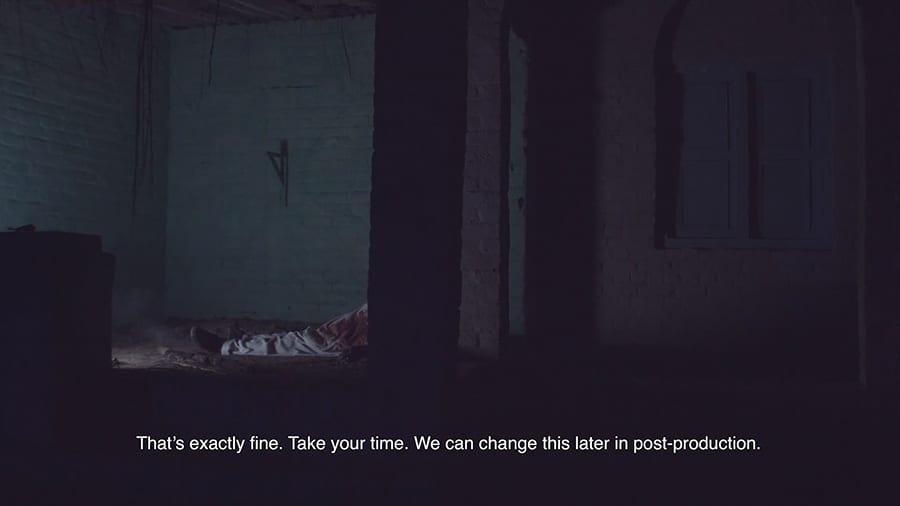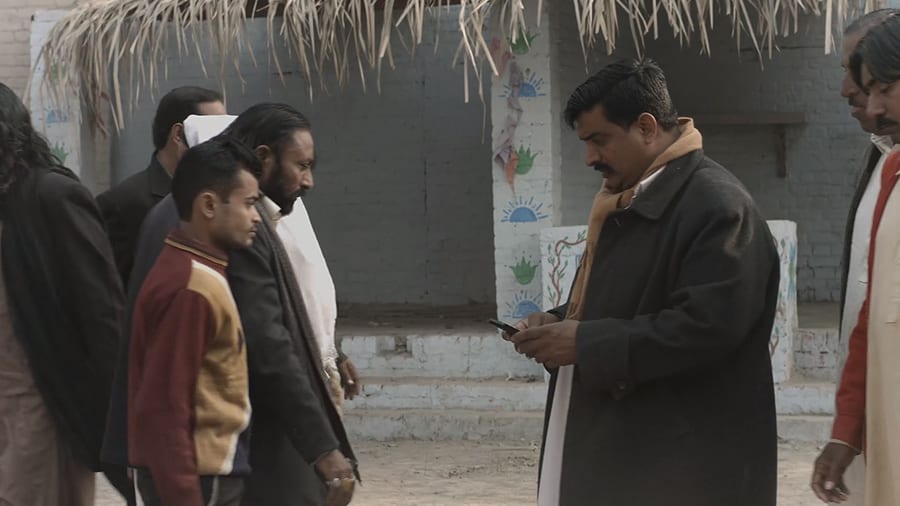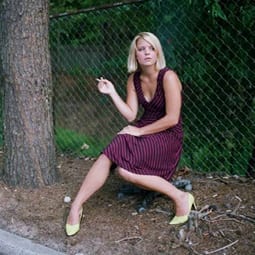Basir Mahmood once made sculptures for Pakistan’s army. His skill earned him a place in Pakistan’s Beaconhouse National University, where, in his words, he spoiled himself by not making anything with his own hands, focusing on a theoretical practice instead and making video art. By the time he arrived at Rijksakademie, where he participated in its renowned residency program, he realized how much he had changed. “I had no temperament left for sculptures. Objects were not speaking to me,” he says. When I visited the RijksakademieOPEN in 2017, where the residency’s forty-five participants showcased their work in brilliantly curated individual spaces, Mahmood’s video work All voices are mine was one of many presentations that kept me thinking for weeks. The film shows a variety of background actors awkwardly holding poses and actions, re-performing scenes intended for other films which were never made, in a variety of shots filmed on an artificial village set in Lollywood, a relic of Lahore’s bygone film era.
Mahmood and I spoke about his time at the residency, where he found himself thinking about how he could position himself even further away from the making of his own work. An earlier film of his, Monument of Arrival and Return, was a first step to his new process, where he “sent guidelines to a production company in Pakistan to document porters from the railway station holding my personal belongings which I left in Lahore. It covered the distance which I kept between myself and the making of the work. So, in contributing only a distance to the work, I found complete liberty in my ideas. Now my only limitation is my mind.”
For his latest film, Mahmood wanted to focus on a more political topic. It had, in fact, been a concept he had been drawn to for many years: a process of making fiction from something very real.

Romke Hoogwaerts (RH): Tell me about your latest film, Good Ended Happily, which depicts a fictionalized aftermath of the raid on Osama Bin Laden’s compound. I know that you left the process of creating the mise-en-scène of the film to the director of action and the crew you worked with in Lollywood. What was the directive you gave them?
Basir Mahmood (BM): I chose the Osama Bin Laden raid for a reason. It was a chance for me to depend on the imagination of others involved in the process making a film, so after initiating, I could distance myself to witness a reconciliation between the actual event and its re-narration, between fiction and the reality in which the film was made. Everybody knows about this raid in Pakistan, but we don’t have any images of it at all to make sense of it. There’s no visual reference. That helped open up the process; you can interpret it however you want.
The film is shot in the village set in a Lollywood studio. I tried to set up everything to shoot in a single night. The set has been there for the last forty, forty-five years and has been used in many films. I like to work with people who work in the area and who are mainly involved in film, but who don’t have many jobs. Of course, as a video artist, I can’t afford to have very good people to work with, I’m sorry to say. A few years back when I had no money, I would go around and employ day-workers and pay them the money they charge other professional filmmakers. That way, I could have more people to work with, to observe them in front of a camera.
During the filming of Good Ended Happily, the people I hired realized that I have a different way of working. They often asked me what I was doing. I’m not completely a producer, nor am I completely a director. I’m a storyteller, though I’m not interested directly in the story, but rather the condition in which the film was made. I’m not interested in final images; instead, it’s the process itself that is the work. Even the time I spend before [production], that is the work. I find the process of filmmaking so exciting that when I have to be in the editing room or see it finished, I can’t be fully present. I always think about the process.
RH: The process does seem like an inherent part of the concept. The labor of the participants in this film is the critical part, and your hand in that as the concept-builder, the image-maker, is really crucial. There are so many layers to this film. As a person who has spent so much time in America, I immediately wondered about the participants’ perspectives on the whole event. All the dead bodies appear so innocent, and it all seems somewhat sentimental. To me, it seems in a way very fictionalized. But that also seems appropriate given the perspective. What are your thoughts on the political aspect?
BM: When the raid happened, I didn’t want to touch it right away, but I kept it in mind. I wasn’t equipped to make this work at that time. When it happened, it was a kind of a funny situation; I think [a majority of Pakistani locals] did not believe that it happened in Pakistan. Out of nowhere, the Pakistani Prime Minister at the time congratulated the U.S. on the raid, and then he realized he made a mistake, you know, because they had invaded his country. So then, the Prime Minister said he knew about it. Then the Army said they didn’t. In both conditions, it was a difficult position to take. It became a popular topic of conversation on television.
Then, [U.S. forces] took his body and destroyed the compound. We were left with all these rumors. Is he living or dead? What is happening? Bin Laden was a person we grew up hearing about. In school, there was a myth that it wasn’t just one person, that he had eight copies. We used to have this [idea that] you can’t kill him. These sort of things went on and on, and I like this idea that I don’t know what is happening in my country. I only see through social media, so when I see an actual… well, I once saw a bomb blast right in front of me.

RH: Really?
BM: Yeah. That was very different than what I see on television. I didn’t feel scared at all. I feel more scared when I see it on TV. It’s so strange. There was a time when there was a lot of bomb blasts in Lahore. This one was in Moon Market in Lahore in 2009. It was very close to my house. I wrote a small article about the experience of being there. I remember the next day all these mosques started to call for prayer or funerals.
Events like these, and what they create all around, how do I open it completely? How do I open it in the minds of the people? Of course, I know that I’m dealing with something so crucial, something everyone knows about, but how do I dismantle [an event] to see something else?
In the film, [the crew and actors] are making fiction of something everyone is equally aware of, but they did not know that they were [being documented] making it. They thought they were making something believable, and that you would believe it, too.
RH: I think what I’m getting from this conversation is that, well, after the raid, it was fictionalized within moments. Your film is a commentary on that, another version of a fiction of it. And that’s kind of how anything like this in the news is spun; it’s always entangled with emotion and different perspectives.
BM: These are the only positions we can take, to make sense what happened. We didn’t even know we had Osama. How do we deal with that? How do we deal with the aftermath? Even now, if you go out and ask people on the street, they would have very fictionalized, strange stories. Some people say he died like twenty, thirty years back. Some people say he died in an operation he had, or that he was shot. Various things.
RH: I remember when it happened, that the body was disposed of, and the compound was blown up like you mentioned…
BM: What I’m saying is that now, it doesn’t matter if it really happened or not. It’s so fictionalized! We’re living with stories.
RH: I think that’s one of the things that America is so good at—building narratives. It’s a media powerhouse. I think within America, people really get lost in that, and they have a hard time looking outside of that dome. But let’s talk about All Voices Are Mine. It’s much less politically loaded. From my perspective at least, it appears to be this kind of Western, fictionalized imagination of what Pakistan might look like. Can you tell me what your thesis is for it?
BM: The place where it was shot is five minutes away from the home where I was raised. So, I’m quite familiar with this place, Lollywood, centered in Lahore, where there were two main studios. As a child, my father and I would walk there after dinner every evening to see these films being made. My father was a film fan and he once got an opportunity to write a song for a film, but the film went bankrupt. We grew up listening to that song and we didn’t know what to do with it.
I started to think about what happened to all the stories and narratives that might not have been made, especially with the influences at the time, when the film industry went down rapidly from making like, 150 films a year, to just two or three films a year. What happened to all these stories and narratives? They might be somewhere floating in the air.
Of course, there are many political reasons for that decline. The 1977 martial law was one reason, the religious rise, which happened during the Afghan war, which influenced Pakistan. Television became very controlled, film started to be censored, and the country was changing so quickly that the film industry became irrelevant to society. I started to think about all these stories and narratives like my father’s songs and thought it might be many other things which are floating around. Then, I got a commission from Sharjah Art Foundation to make the work. With that funding, I could afford one day of activity so we started filming from early morning into the late evening. I also wanted the film to depict the time [taken to produce] the film. Rather than asking actors to do this or that, I would ask them what they could do for the film according to the skills they had, or what they had performed previously in other films, and then started to put them into an order where we could make sense of it. I would set up the camera and just ask them to act. There were no direct ‘action’ or ‘cut’ that took place—we just kept on recording. I was interested in moments when actors would lose themselves and forget they were acting.
What I enjoy about being an artist is the liberty of going into these different worlds, opening these windows, exploring what is possible, to just learn from them, and then get out, clean your hands and look for something else. My medium and materials are only ideas. That might be hard to understand for some.

RH: How much do how much time do you spend on the composition, or do you leave that to the director of photography or camera operator?
BM: I resolve visual concerns very quickly, but it depends on the work, too. Usually, the camera is on my side, and for the work All voices are mine, I worked with a DP to decide where to position a camera and when to start filming. In Good Ended Happily, it was not within my control. I asked the DP to decide the movements that were convenient for him and which he thought would best cover the action.
RH: What about your photographs?
BM: I don’t struggle much with the images; I try to resolve them quickly, too. I spend time thinking, and then I take a lot of photographs. It takes a lot of time for me to have the courage to show them. Right now, I have a solo show in Karachi at Canvas Gallery that includes six photographs.
RH: Before I go, tell me more about your father. Was he a songwriter?
BM: He was an accountant for 35 years, but he was also a poet. At one point, he wanted to be a singer but his father was a very strict person who didn’t want him to be a singer. So, [my father] wrote under different names before he wrote under his own. My father was a great influence on my work and the way I think. The older I get, the closer to him I feel; I try to see things through his eyes.
When we would go for our walks after dinner, which I mentioned earlier, my father would write two lines of poetry for a newspaper. My memory of seeing him writing those two lines, seeing this poet in process, walking around, writing about society or whatever he sees, that memory influences my work now. I make what I see.

